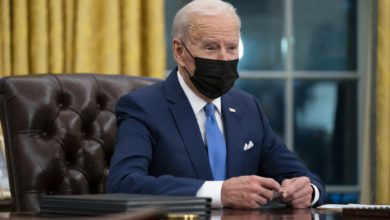As Kentucky Derby fans traveled along I-71 to and from Churchill Downs over the weekend, it would've been hard not to notice while driving through Sparta the thousands of Super Duty pickup trucks parked in rows.
This illustrates the multibillion-dollar impact of the ongoing global semiconductor shortage on the auto industry, specifically Ford Motor Co. Super Duty trucks built by UAW members at the nearby Kentucky Truck Plant in Louisville.
These days, they're built and parked awaiting parts.

"Ford will build and hold the vehicles for a number of weeks, then ship the vehicles to dealers once the modules are available and comprehensive quality checks are complete," Kelli Felker, Ford global manufacturing and labor communications manager, told the Free Press in response to questions about the Kentucky stockpile on Monday.
When America's bestselling F-Series is parked, Wall Street pays attention.
John Lawler, Ford chief financial officer, told industry analysts after first-quarter earnings April 28 that the company had approximately 22,000 vehicles parked and awaiting parts at the end of March.
And the numbers continue to grow.
"The semiconductor shortage and the impact to production will get worse before it gets better," Ford CEO Jim Farley said after earnings posted.

In fact, Intel Corp. CEO Pat Gelsinger predicted the problem will plague the auto industry "for a few more years," Bloomberg reported Monday.
More:Ford stockpiling thousands of new F-150 pickups near Metro Airport
More:2021 Ford F-150s parked at Worlds of Fun in Kansas City awaiting quality review
The microchip nightmare crippling auto factories globally is hitting Ford Motor Co.'s operations the hardest globally in terms of actual vehicles taken out of the production schedule, according to AutoForecast Solutions in Chester Springs, Pennsylvania. The company calculates factory-by-factory company announcements, shift production and work schedules in the U.S., Asia and Europe.

So far, that lost vehicle production this year has been projected to be:
- Ford, 362,663 fewer vehicles
- General Motors, 326,651
- Renault Nissan Mitsubishi, 284,948
- Volkswagen, 207,521
- Stellantis, 202,486
- Toyota, 113,555
- Honda, 82,482
Automakers impacted to a lesser extent include BMW, Hyundai, Daimler and Tesla. These figures do not include joint ventures between the Detroit Three and their partners in China, Russia, Turkey and elsewhere. The GM numbers include its subsidiary GM Korea.
While vehicle production could be made up toward the end of the year, it is less likely with every month that passes.

Meanwhile, GM is the hardest hit automaker in North America based on current projections for the year:
- GM, 277,030 vehicles
- Ford, 234,964
- Stellantis, 162,087
- Subaru, 45,272
- Honda, 42,951
- Renault Nissan Mitsubishi, 41,928
- VW, 36,429
- Toyota, 23,670
- Tesla, 6,418
Some reduction was seen by Mazda and Hyundai, too.
GM is scheduled to release earnings Wednesday. Stellantis said it will reveal its shipments and revenues the same day.
"This is a growing concern," said Sam Fiorani, vice president of global vehicle forecasting at AutoForecast Solutions.
"Like COVID last year, from the beginning it seemed like it would go away in the near term but as the months go by, it's growing into a bigger and bigger issue," he said. "It takes so long to get a plant up and running that's dedicated to these particular chips. With the increased computerization of vehicles, these chips are the lifeblood. They operate the powertrain control unit, the infotainment. You can drive a car without the infotainment system but you can't sell a car without an infotainment system. You can't run an engine without certain chips. They're the nerve center of different sections of the vehicle."

Ford was the first of the Detroit Three to release its first-quarter earnings, which exceeded Wall Street expectations. But then the company forecast depressed the stock price almost immediately.
“All automakers will be dramatically impacted by the chip shortage so it sure seems off that Ford got punished for its transparent honesty," said market analyst Jon Gabrielsen.
Ford challenged whether its situation is much different than its competitors.
“The global semiconductor shortage is affecting automakers around the world — as well as other industries, including consumer electronics companies," Jennifer Flake, executive director of global product communications, told the Free Press in response to the AutoForecast data.
"Ford is concentrating on how to best use our allocation of semiconductors to deliver high-demand vehicles to customers around the world," she said. "Ford was among the first automotive companies to highlight the potential impact of (the) semiconductor shortage earlier this year to first-quarter production and our forecast was in line with the actual impact to the industry, as reported by IHS. Our most recent forecast for the second quarter is based on commitments from our suppliers who also support other automakers. Therefore, we don’t know that Ford is unique.”

Ford was hit hard by a March 19 fire at the Renesas plant northeast of Tokyo, a leading semiconductor supplier that makes about two-thirds of all chips in the auto industry, Farley said. The chipmaker isn't expecting a return to full capacity until July.
"Estimates project the full recovery of the auto chip supply will stretch into the fourth quarter of this year and possibly even into 2022, making industry volume recovery in the second half of the year even more challenging," Farley said.

Ford expects the chip crisis to cost the company an estimated $3 billion this year, Lawler said.
But that's not all that automakers are facing.
While commodity price remained stable because of 2020 contracts, Ford is now expecting to see prices on aluminum, steel and precious metals increase by about $2.5 billion, Farley said. "So that's going to hit us as we go through the rest of the year."
Investor's Business Daily said Thursday: "Ford Stock Sinks After Slashing Q2 Production Targets On Chip Shortage That May Last Through 2022."
Barron's said on the same day, "Ford Earnings Crushed Expectations. Why the Stock Is Dropping."
This is what happens when the chief financial officer lowers expectations for full year earnings from $8 billion to $9 billion to between $5.5 billion and $6.5 billion,

Still, analyst Adam Jonas of Morgan Stanley wrote to investors on April 28, "Put it all together and the most favorable auto supply/demand balance in a generation and Ford’s cost-cutting efforts are bearing fruit at a critical time for the House of Dearborn. 2021 is likely to go down as an ‘oddball’ time for the industry given the confluence of consumer strength, inventory tightness and extremely disruptive supply chain issues."

At issue, now, is what the "new regime" led by Farley tells Wall Street on Capital Markets Day on May 26, Jonas said.
When Ford announced the possibility of a licensing deal for Volkswagen AG’s electric car technology, as reported by Bloomberg, stock climbed again. Ford told the Free Press it had nothing to announce yet.
More:People are clamoring for Ford F-150s now trapped in Detroit parking lot
More:Ford CEO 'humbled' to team up with top environmentalist as part of global team
Contact Phoebe Wall Howard at 313-618-1034 or[email protected].Follow her on Twitter@phoebesaid. Support our reporting with a digital subscription of $1.00 for 6 months. Read more on Ford and sign up for our autos newsletter.









